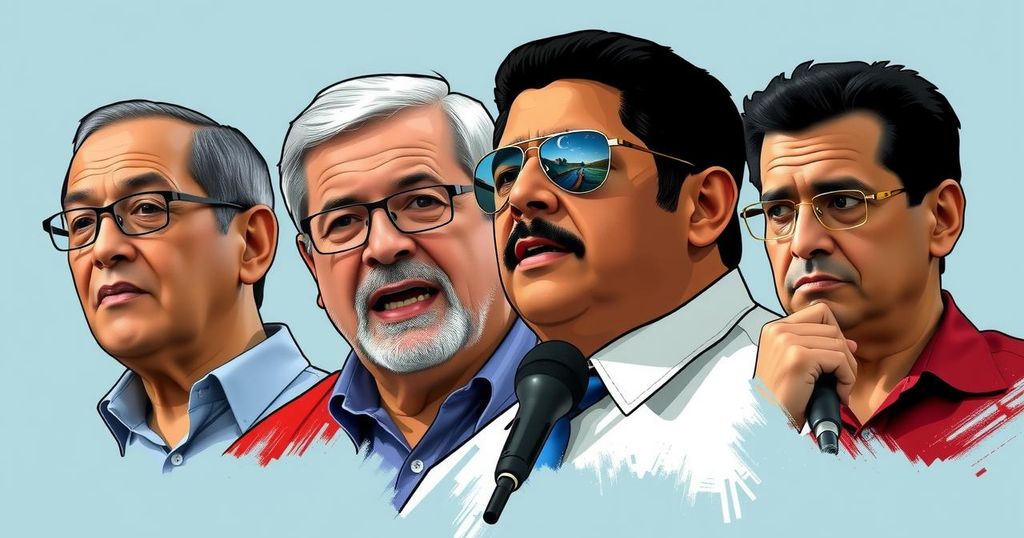Six Venezuelan opposition figures sheltering in the former Argentine embassy in Caracas report escalating harassment and surveillance, amidst a contentious political climate following the disputed July 2024 presidential election. Argentina, Brazil, and the OAS are urging for their safe passage, despite resistance from the Maduro government, raising concerns over international diplomatic norms and human rights.
The political crisis in Venezuela has escalated with six opposition figures sheltering in the former Argentine embassy in Caracas facing increased repression. These individuals reported a rise in harassment, including persistent surveillance, disruptions of basic utilities, and arrests of local staff. Both the Argentine and Brazilian governments, alongside the Organization of American States (OAS), are advocating for the safe passage of these opposition members amidst tensions with Nicolás Maduro’s regime. The backdrop of this crisis lies in the contentious presidential election held in July 2024, which has exacerbated the nation’s political divisions.
Since March 2024, the six opposition members, including campaign manager Magalli Meda, sought refuge following severe threats due to their political affiliations. Although initially protected by Argentine diplomats, the situation deteriorated when Brazil’s authority over the compound was withdrawn after the expulsion of Argentine personnel. Recently, reports of armed surveillance and utility cut-offs have intensified, prompting calls for urgent action to protect the basic human rights of these individuals. Meda’s poignant plea for intervention underscores the critical nature of their plight: “We are seeing how the process of violating our basic human rights is accelerating. It is urgent to stop this repression, whether psychological or physical.”
Venezuelan officials, however, have dismissed these allegations as unfounded, with Interior Minister Diosdado Cabello labeling them a mere distraction. This denial reflects the government’s ongoing resistance to international pressures, particularly amidst accusations of election fraud that followed the July presidential election—an event that further fractured the Venezuelan political landscape as each side contends with claims of electoral illegitimacy. The situation remains precarious, with Argentina and Brazil leading diplomatic efforts to ensure safe passage for the opposition members, which have received support from various OAS member states advocating an end to the harassment.
The international community’s response towards this diplomatic crisis is crucial, already nearing a flashpoint highlighted by the potential violation of international norms surrounding the protection of diplomatic premises. Despite some countries retaining relations with the Maduro government, a significant portion, including OAS members, increasingly criticize the regime’s handling of dissent. Vigilance and immediate action from regional governments are imperative, as articulated by Pedro Urruchurtu, one of the opposition figures, who warned of the risks stemming from inaction: “We ask Brazil and others to redouble their efforts, understanding that this situation can worsen. It demands the attention of the entire region.”
This unfolding situation reflects the broader struggle for Venezuela’s political future, necessitating coordinated regional intervention to uphold both human rights and international diplomatic standards. As the opposition navigates increasingly hostile conditions within the compound, the urgency for safety and recognition of their legitimate claims remains paramount.
The ongoing political crisis in Venezuela stems from a July 2024 presidential election rife with allegations of fraud, resulting in a divided political landscape. The opposition disputes the legitimacy of Nicolás Maduro’s claimed victory, asserting that their candidate, Edmundo González, received significantly more votes. In response to threats from the Maduro regime, six opposition members sought refuge in the former Argentine embassy in Caracas, where they currently face severe harassment and intimidation. Amidst rising tensions, Argentina, Brazil, and the OAS are advocating for their safe passage, highlighting significant international concerns regarding human rights and diplomatic sovereignty.
The current plight of the Venezuelan opposition members reveals the deep-rooted issues within the country’s political crisis, exacerbated by a contentious election and the Maduro government’s oppressive tactics. The urgent need for safe passage and adherence to international diplomatic norms is emphasized through the advocacy of regional powers like Argentina and Brazil, alongside the support of the OAS. Continued international attention and action are critical to ensuring the protection of basic human rights for these opposition figures within Venezuela’s turbulent political landscape.
Original Source: www.newslooks.com






